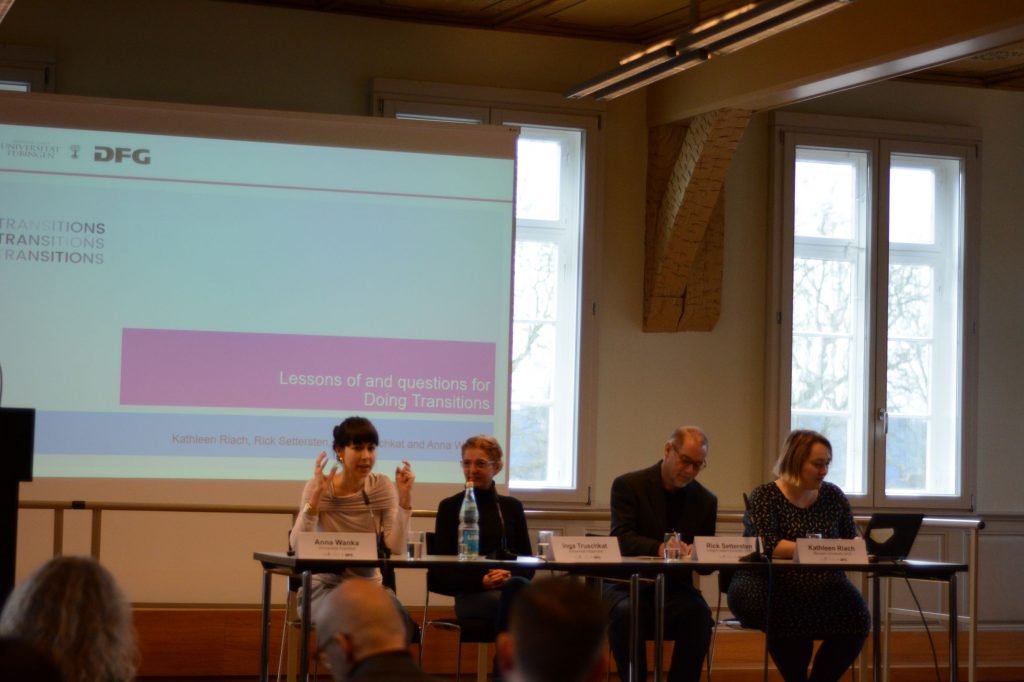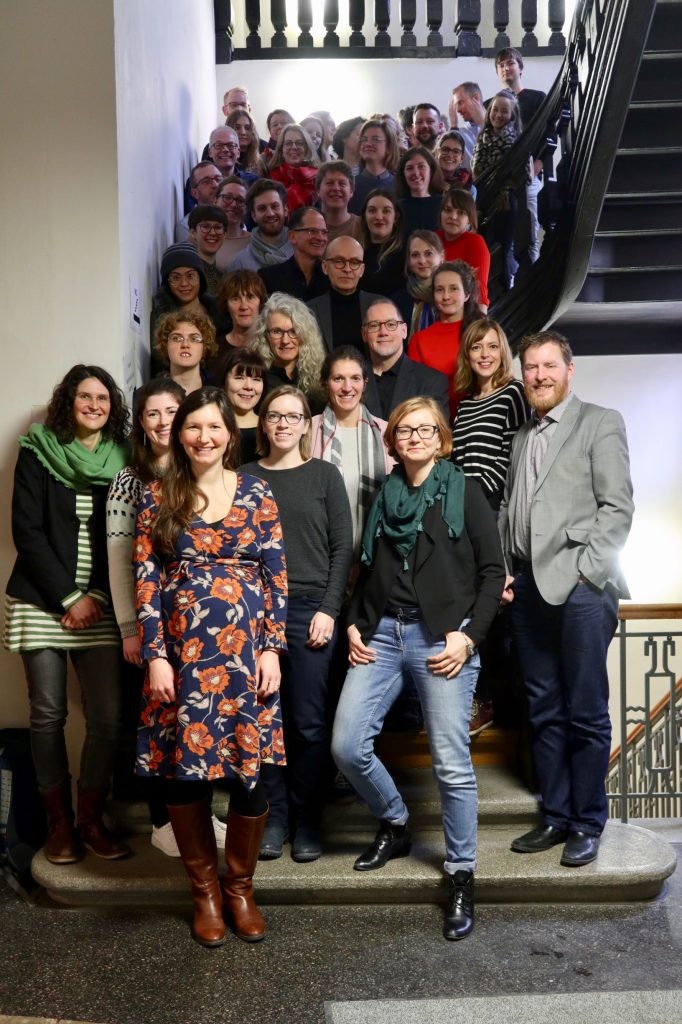From 17th to 19th February the second international conference of the research training group Doing Transitions was held in Tübingen. This conference was an event “inbetween”: It documented the passage from the first cohort of phd-students, presenting findings from their phd projects, and the second cohort, who have started only six weeks ago, presenting their projects in a poster session. Thereby, it also represented an intermediate resume of the process of developing and applying a reflexive perspective for the research on transitions in the life course. Inspired by key notes and comments of discussant speakers, these considerations will be developed further. The conference was characterised by a highly productive atmosphere among early career researchers and senior scientists and was regarded as a big success by all participants and guests.
Key findings of Doing Transitions were presented and discussed in six thematic panels:
- Doing transitions differently – everyday life and extraordinary transition practices: this panel included the works of Julia Prescher, Kerstin Rinnert and Anna Wanka commented by Tobias Boll from the University of Mainz focussing on the subtle processes of doing difference in research practice.
- Biographical articulation in transition: under this title the presentations of Jessica Lütgens and Andrea Pohling were discussed by Tina Spies (Protestant University of Applied Sciences, Darmstadt) who stressed the relationship between transitions, biographies and processes of articulation (following Stuart Hall).
- Doing transitions through welfare organisations has been the theme bringing together findings of the studies of Bianca Lenz, Heidi Hirschfeld and Noreen Eberle on how being addressed by and using measures of youth welfare, labour market policies or adult education is interrelated with individual biographies. These contributions were discussed by Eva Nadai (University of Applied Sciences of North Western Switzerland, Basel).
- Embodied transitions and bodies in transitions: under this heading Janne Krumbügel and Deborah Nägler presented some findings of their studies. In her discussant note, Imke Schmincke from the University of Munich emphasised the relation between bodies, interaction, and social change.
- Doing transitions in, through and of space was the title of a panel including presentations by Tabea Freutel and Helena Müller and a discussant note by Anamaria Depner (University of Heidelberg). One key aspect of the discussions were how transition practices shape and structure the social spaces in which they evolve.
- The role of organisations as collective subjects in doing transitions assembled contributions of Eva Heinrich and Nils Klevermann which were commented by Inga Truschkat from the University of Hildesheim. Here a point of discussion was how organisations both contribute to and at the same time are subjectivated in processes of doing transitions.

The thematic panels were framed by four keynote papers: Rick Settersten (Oregon State University) opened the conference with an inspiring talk on the relatedness of lives and the role of relationships in life course transitions. This included not only the role of linkages but also of unlinking lives in cases of leaving and loss. Kathleen Riach (Monash University Melbourne) related to these reflections with a paper on the bodily politics of ageing transitions within organizational life, in which she pointed to interpellation as inbuilt in our bodily experiences – and the ways in which these are either acknowledged or ignored. Heinz-Hermann Krüger, University of Halle, in his talk reminded of the challenges (but also the fruitfulness) of longitudinal approaches for transition research, presenting findings from a study on students from elite schools and their transitions into university and employment. Laura Bernardi from the University of Lausanne held the last keynote on Relative time in life course research, in which she engaged with “multidirectional, elastic and telescopic understandings of time”.
The inspiring reflections and debates from these different formats have been extremely valuable for developing “Doing Transitions” further in terms of relational perspectives in analysing transitions in the life course. In particular, a future challenge will be to study how transitions are constituted as intersected and interwoven with interpersonal relationships, temporalities and different materialities – like artefacts, welfare regulations, embodiment and spacing. All in all, the conference confirmed the need and the fruitfulness to theorise life course transitions through analysing processes of constitution.

Presentations / Keynotes:
- Keynote 1 – Relative time in life course research (Laura Bernardi)
- Keynote 2 – The bodily politics of ageing transitions: Negotiating in and through organizational life (Kathleen Riach)
- Keynote 3 – Exclusive careers: Longitudinal findings of young adults‘ transitions into university or employmen (Heinz-Hermann Krüger)
- Keynote 4 – Unlinked Lives: Notes on Leaving and Loss (Richard A. Settersten)
Presentations Panel 1 / Doing transitions differently – everyday life and extraordinary transition practice:
- Using the internet as a space of opportunity for queer transitions (Kerstin Rinnert)
- Cycling, travelling, renovating – bodies, spaces and things in doing retirement (Anna Wanka)
- Bodies and clothing in rites of passage towards adulthood (Julia Prescher)
Presentations Panel 2 / Biographical articulation in transition:
- Biographical narratives on educational upward mobility in adulthood (Noreen Eberle)
- Biographies of politicisation in adolescence (Jessica Lütgens)
- Transitions to articulating experiences of sexual violence in the public (Andrea Pohling)
Presentations Panel 3 / Doing transitions through welfare regulation:
- Social disadvantage and the power(lessness) of support in school-to-work transitions (Heidi Hirschfeld)
- The ‘right‘ help? How youth job center clients negotiate their biographies (Bianca Lenz)
Presentations Panel 4 / Embodied transitions – bodies in transition:
- Discourses on the pregnant body in advice literature (Janne Krumbügel)
- Growing up in an individualised society -bodies between childhood and youth (Deborah Nägler)
Presentations Panel 5 / Doing transitions in, through and of space:
